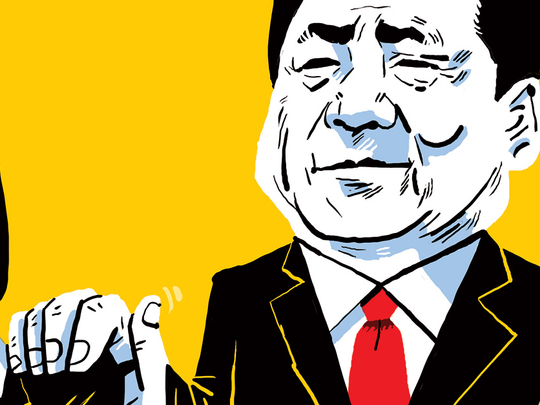
Until recently, Sun Zhengcai, the party secretary of the metropolis of Chongqing, “the Chicago on the Yangtze,” was seen as a possible successor to Xi Jinping. Then, in July, the Communist Party of China launched an investigation against him for corruption, leading to Sun’s dismissal from office and the precipitous end to his political career.
Throughout the western press, the removal of Sun was treated as conclusive proof that Xi planned to remain in charge after 2022, when term limits and political tradition will require him to give up power. This has been a common trope in the hazy world of Chinese political analysis since at least 2015, when Foreign Policy published ‘Xi Jinping Forever’, arguing that the Chinese leader would try to extend his rule beyond two terms. A constant stream of articles, especially in the run-up to last week’s 19th National Congress of the Communist Party, has reinforced the consensus that Xi Jinping isn’t going anywhere anytime soon.
But Xi’s ambitions have been vastly misunderstood, and Sun’s dismissal is a critical case in point. Xi used Sun’s removal not to aggrandise himself, but rather to quietly designate, in violation of recent tradition, his own desired successor for 2022 — someone whom, for at least the past five years, Xi has managed to groom to carry forward his legacy without attracting too much attention. Xi has more than half a dozen allies in positions of power throughout China’s provinces — like Li Qiang, the Mongolian Bayanqolu, or Li Xi — any one of whom could have been named as Sun’s successor in Chongqing. But Xi’s choice was striking: He promoted his ally Chen Min’er, who was born in 1960. In choosing Chen Min’er as the new leader of the metropolis of Chongqing, Xi has sent a broad hint to both the party and the outside world. The Communist Party doesn’t hold press conferences to announce successors; it uses signals like this — even if few in the West seem to be able to understand them.
Xi’s privileged treatment of Chen is consistent with their relationship since the early 2000s, when they met in the province of Zhejiang, where Xi was serving as provincial party chief. Chen was the head of the provincial propaganda department, in charge of spreading Xi’s message throughout Zhejiang. In this position, he helped write Xi’s weekly column in the provincial party newspaper for almost four years.
Xi left Zhejiang in March 2007, when he was moved to Shanghai, only seven months before the 17th Party Congress. Meanwhile, Chen remained behind in Zhejiang, being named vice governor and then becoming an alternate member of the party’s Central Committee at the 2007 Party Congress. In January 2012, Chen was promoted to the position of deputy party chief of the province of Guizhou. At the 2012 Party Congress, where Xi was named general secretary of the party, Chen was promoted as one of the 205 full members of the Central Committee and later appointed governor of Guizhou.
Chen’s five-year stint in Guizhou coincided with an acceleration of China’s fight against extreme poverty. Guizhou is one of China’s poorest provinces, but has a good track record of producing leaders. Hu Jintao, Xi’s predecessor, was Guizhou’s party chief in the 1980s. There, Chen was tasked with tackling one of Xi Jinping’s most important objectives: The eradication of extreme poverty by 2020. In the process, he made some resounding moves, like convincing Apple to build a data centre in Guizhou. Under Chen’s leadership in 2016, Guizhou reported the third-fastest growth among Chinese provinces, with a claimed gross domestic product growth rate of 10.5 per cent.
In return, Xi has repeatedly signalled his trust in Chen, who was promoted to party chief of Chongqing three months before the 19th Congress.
Over the past three decades since Deng Xiaoping retired, Chinese leaders haven’t been able to name their own successor. Jiang Zemin had to accept Hu and fought to keep his own influence alive in the 2000s as a result. Hu couldn’t install Li as his successor and had to accept Xi. Now, in a sign of his own strength compared to his predecessors, Xi has purged one heir apparent, replacing him with his chosen ally. Only two possible successors remain: Chen or Hu Chunhua, Hu Jintao’s ally.
Unlike Hu Chunhua or Sun, Chen hasn’t been a member of the 25-person Politburo, so his chances of becoming China’s next leader were slimmer. But now, when Xi negotiates with party leaders and proposes Chen as his successor, they may be inclined to say ‘yes’, keen to avoid Xi’s hypothetical third term. And so, Xi may do something no Chinese leader since Deng has achieved: Designate his own successor and maintain his own influence from behind the scene once he retires.
— Washington Post
Andrei Lungu is president of the think-tank Romanian Institute for the Study of the Asia-Pacific. His research interests are China’s foreign policy and its domestic politics, Sino-American relations and the balance of power in the Asia-Pacific.












